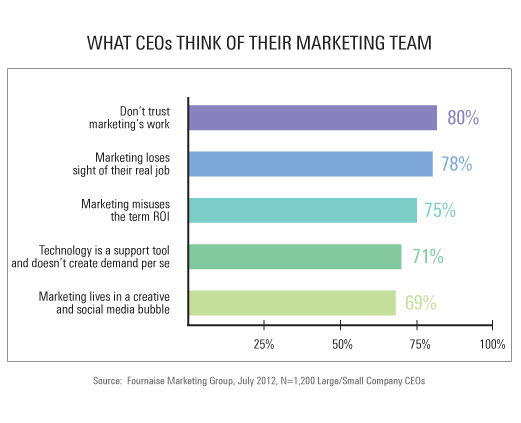80% of CEOs Don’t Trust Marketing
No more Mr. Nice Marketing Guy
Somewhere along the way, marketers lost the trust of their CEOs. A 2012 study by the Fournaise Marketing Group shows pretty conclusively that the vast majority of CEOs in large and small B2C and B2B companies aren’t impressed by the work that their marketing team does. CEOs believe that marketers are too caught up in their creative, social media, and marketing technology bubbles and that, as a result, marketers are too disconnected from the financial realities of their business. Are the CEOs right?
The reality is that most businesses rarely go as swimmingly as everyone would hope. So who’s to blame? Unrealistic expectations by the board, CEO, and team rank highly, of course. But once those stakes are in the ground and the CEO leaves the board meeting for the office, he/she’s going to be eyeballing those responsible for business generation, and asking the tough questions. Makes sense. Sales and marketing, in particular, carry that bag.
What’s a poor marketer to do?
So what’s a poor marketer to do to earn the trust of the untrusting CEO? There’s only one thing to do: connect what you do to revenue, prove that connection, and then drive revenue. That is, after all, what you signed up for, right?
While there are a gazillion trusty metrics to prove marketing’s worth, it strikes me that the problem for marketing has less to do with metrics, and more to do with the sales team – always has been, always will be. I recall a sales rep who, when hearing marketing take credit for a lead that came in, pointed out that the rep’s mother’s aunt had shared a pint with the mother of the prospect in Ireland a year before and, as a result, he (the rep) had touched the lead first. I exaggerate only slightly.
Perception, often, is reality. Marketers need to aggressively take ownership of the opportunities that they usher in the door, and then aggressively promote that ownership. Antagonistic? Maybe. Anti-team-like? Whatever. Remember that nice marketing guys finish last.
Set up a marketing war room
While all the key prospect opportunities you’re responsible for are likely captured in your wonderful marketing database/ spreadsheet/ marketing automation system, no one but you ever looks in there. Think like a marketer. Get those opportunities out from hiding and up on the wall. Create a marketing war room (or a war wall if you’re tight on space) and make sure that the prospects that count are up there for all to see. Use logos if you can. Include the various ways marketing touched the prospect. Show the prospect’s progress through the marketing/sales funnel in a simplified fashion. Make the whole thing easy to absorb at a glance. Make it visual.
“Well, Drew, that’s all fine and good, but I’ve already got these key prospects in the report I present to the team every week.” Here’s one for you: out of sight, out of mind. Get your successes up like a billboard that no one, especially your CEO, can miss as they go by several times a day. The secret to successfully teaching someone something is repetition. Set your audience up for unavoidable repetition.
Like a blog, make your war room/ war wall a living, breathing thing. Make it current and vital. If you do, many will drop by through the week to see the progress – including the sales team who, you will recall, need to be reminded of your efficacy as much or more than anyone in the company.
And keep the key prospects which didn’t turn into a sale up there too, in a corner box somewhere. The fact that marketing brought in a key prospect that sales didn’t close is most often lost on everyone.
Then, when it comes time to attribute a sale, believe me, your job will be a lot easier. Prospect X was up on the wall for five months. Now Prospect X is a sale. Less gray area. Marketing goes plus one.
People are funny. For better or for worse, they tend to respond to the loudest person in the room. Marketers, ironically, need to learn from sales and get a lot louder. Only then will the connection between marketing and revenue become more clear. From now on, no more Mr. Marketing Nice Guy.
About Drew Williams
My name is Drew Williams. I’m an author and marketing entrepreneur. “A what?”, you say. I call someone who’s passionate about building businesses a marketing entrepreneur. So that’s me. Full Profile | Google+







Recent Comments